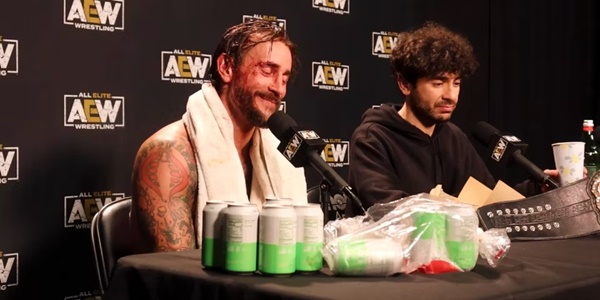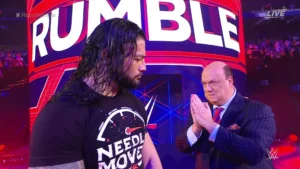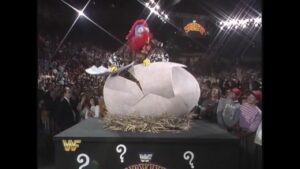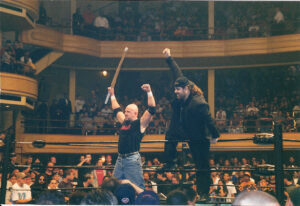Over the last 3 days, it’s become no secret that All Elite Wrestling (AEW) is a place of great turmoil. As many reading this are likely aware, CM Punk went on a tirade on the post-All Out media scrum. He addressed Scott Colten (Colt Cabana) by name; addressing the rumors that have persisted since his (Punk’s) arrival in AEW. He also addressed the “EVPs” of the company, which would be Kenny Omega and the Young Bucks (Matt & Nick Jackson), as well as “Hangman” Adam Page. Several of the things he said were incredibly inflammatory, and the comments apparently stirred up a fight between Punk and his longtime friend (and trainer) Ace Steel, and all 3 members of The Elite backstage – whilst AEW boss, Tony Khan, was still holding the media scrum.
All of this understandably has the wrestling world buzzing with speculation, opinions, and rumors, but in all of this, what’s most interesting is a quote from Punk during the scrum, in reference to the Elite, and Adam Page.
“…trying to f*king make money, sell tickets, fill arenas. These stupid guys think they’re in Reseda [California].”
A reason to find this so interesting is how indicative it is of the larger problem between these two factions. What it comes down to, barring EVP statuses and rumors, is a major difference in wrestling philosophy, that was always going to boil over at some point.
Two Schools of Thought in Wrestling
There’s a quote from Cody Rhodes during a live sit-down interview with Inside the Ropes in 2016 with Kenny McIntosh, where he spoke briefly about how most people in wrestling have one of two mentalities.
“I think, as a talent, some guys just like to get paid, and that’s great, and other guys are more looking for the creative fix.”
While he probably didn’t mean it this way, what he said was indicative of something that’s been prevalent in pro wrestling for as long as most fans, even older ones, can remember: that is, the problem of generational change. Every decade or so in wrestling, it happens that a changing of the guard creates a rift between the older generation, and the younger one.
How it usually goes is this: the older generation usually believes that the younger generation needs to slow down, work smarter and not harder, and focus on doing everything well instead of one thing excellently, as it’s easier to make money as a whole that way. The younger generation, however, usually must disagree on the grounds that they’ve already found their own way of doing things, and it (usually) works just as well.
How this Applies to Punk and the Situation as a Whole
There is, as they say, more than one way to skin a cat. What’s always funny about it though, and CM Punk is no exception to this considering what he said, is that the older generation was, at one point, the younger generation, and was most likely just as picked apart by their elders.
This applies to none better than CM Punk at the moment. What’s meant by this is that it’s interesting that CM Punk of all people would imply that working the Reseda (clearly a shot a PWG and the Elite/Hangman’s body of work there) is in someway insignificant in comparison to his body of work, presumably with the WWE. Of course, he’s correct in saying that the two are different. What will work in PWG will obviously not always work in WWE, or even AEW for that matter.
What he really meant with the Reseda line was this: having great matches, while an important part of pro wrestling, is not all it takes to run a major, national pro wrestling company. PWG is a different animal, obviously, one that doesn’t have television deals for weekly episodic content, nor does it have to depend all that much on merchandise sales beyond DVDs. Again, he is not incorrect in saying this, though his manner of doing so was demeaning and crude, clearly to make the Elite and Hangman look small and childish.
What Happened to CM Punk?
Punk finds himself with an odd point of view on the wrestling world at the moment. At one time, he was about as anti-WWE as anyone you can find, and would (and still will) openly decry and denounce it for several reasons, such as poor treatment of their workers and poor creative and business decisions. At the same time, however, there seem to be remnants of its mentality that have left itself indelibly etched in his mode of thinking.
As Dave Meltzer pointed out over the past week, Punk was away from the wrestling business for 7 years. That is an incredibly long time in the wrestling business, and Meltzer cited Bill Watts‘ run as the head booker for WCW in 1992 as a perfect example of someone who left the wrestling business for an extended period of time (only 5 years in Watts’ case) and came back with very little understanding of the business left. Another good current example would be AEW commentator Jim Ross: someone who didn’t regularly keep up with the wrestling business enough as he got older, and as the result, it passed him by, leaving him an old man at the desk who sounds (at times) irritable, grumpy, and frustrated that the younger generation doesn’t do things the proper way. Sound familiar?
It’s one possibility for why Punk is the way he is, but not the only one
Was the Game Rigged from the Start?
Another possibility is that Punk entered a locker room that was already hesitant to accept him. While no one is accusing anyone of poisoning the roster against Punk or any such nonsense, is it so far-fetched to believe that those on the roster who knew Punk and were wary of him warned others to do the same? For the sake of avoiding accusations, I won’t name names, but if you think for a moment I’m sure you could come up with at least a few popular people backstage who dislike Punk and would want to tell their friends to steer clear of him.
It could also be a case of tribalism, of a sort. As said earlier, CM Punk was away from wrestling for 7 years, and the last company he was a part of was the WWE, which he was a part of for almost 10 years. While this alone probably is of no harm, the fact that AEW had contacted him multiple times in the past to join the company only to have him turn them down could make a lot of difference, especially considering Punk brought up the fact that they tried to hire him in multiple interviews in a somewhat nonchalant manner.
With that in mind, maybe some were resentful of the fact that it felt like Punk didn’t want to come in at the ground floor, but instead wanted to join the company after they’d already proven themselves, leaving those who were there from day 1 feeling a little underappreciated. Again, I am not making accusations or blaming anyone for anything, but it’s a believable idea that, if even half true, would lend a lot to the idea of Punk having an uphill battle with the locker room from the start.
So What Does it all Mean?
There are multiple ways this scenario can play out from here depending on what is found and, more importantly, how Tony Khan reacts or is forced to react to it: if at all possible, he may leave things at suspension and nothing else, allowing everyone to return when they are good and ready. This would keep the roster incredibly strong, which is optimal, but the idea of nobody facing repercussions could also demoralize the locker room even further.
He could fire people if necessary, and this may quell some of the locker room as well as any involved parties, but anybody who exits the company can be sure to have their friends follow suit. If Ace Steel leaves, there can be no doubt that Punk will strongly consider walking, and the same goes for the Elite, whose situation is even more complex due to their EVP status.
And in the end, any combination of these solutions would only be a small part of the problem, like patching up a ship that is currently taking on water. The true solution to the problem, whatever that would be, would have to be something of a preventative nature. That is to say, it will need to be something definitive and final, that not only solves the issue but ensures that it doesn’t happen too often anymore in the future.
In Conclusion
There is a philosophy by the name “Hegelian Dialectics”, named after its philosopher, Georg Wilhelm Friedrich Hegel. Its basis in laymen’s terms is that in any debate, struggle, or battle of any nature, there is a “thesis” and an “antithesis”: an idea, then another idea that comes up to challenge that first one. In the end, these two meet and reach a higher level of truth: a synthesis. The problem with this is that sometimes, in order to reach this higher level of truth, this synthesis, the thesis, and antithesis must battle long and hard, and can be very grueling. What we’re seeing here is Hegelian Dialectic in action (in the wrestling world of all places.) Punk is the antithesis of The Elite’s thesis currently, and is challenging their way of thinking when it comes to AEW.
It remains to be seen what the synthesis of all this will be, or how long it will take to reach there, but we can be sure that when it happens that we will all find out.
More from LWOS Pro Wrestling
Stay tuned to the Last Word on Pro Wrestling for more on this and other stories from around the world of wrestling as they develop. You can always count on LWOPW to be on top of the important news in the wrestling world. You can catch AEW Dynamite Wednesday nights at 8 PM ET on TBS and AEW Dark: Elevation (Monday nights) and AEW: Dark (Tuesday nights) at 7 PM ET on YouTube. In addition, AEW Rampage airs on TNT at 10 PM EST every Friday.






